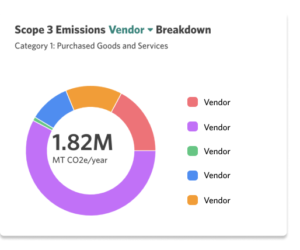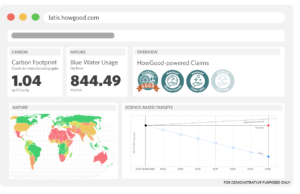Airports around the world are joining the efforts to address climate change. Many have set ambitious goals to reach net zero targets by a certain date. These noble endeavors are largely in response to consumer demands for businesses to take a proactive approach to not only commit to more sustainable practices but to report on them as well. Airports have no shortage of tactics to deploy to lower their carbon footprint. Yet, one challenge could stand in the way of true progress if not addressed – participation from their food and beverage (F&B) vendors.
How terminal food purchases translate to airport emissions

Terminal F&B sales contribute directly to an airport’s net zero goals. Just as a retailer must look at the products it sells on its shelves to report its own emissions, airports have to look at the sales of items within their own operations. Encouraging these vendors to look more closely at their products and ingredients will offer immediate insights into where progress or changes can be made. When you consider that 87% of F&B companies’ annual emissions come from their ingredients, and a third of global emissions worldwide come from food systems, it’s hard to not consider how these items are affecting emissions reduction efforts.
Leading by example at Schiphol airport
Amsterdam Airport Schiphol in the Netherlands has set a goal to become the world’s most sustainable airport by 2030. This public target has bolstered the airport and its commitment has made an impact on its vendors too. Travel retailer Avolta, which works within the Schiphol airport, has recently kicked off its own initiative to elevate its sustainability practices, contributing directly to Schiphol airport’s reduction goals. Avolta has partnered with sustainability intelligence company HowGood to take a deeper look at its products, getting a granular assessment of the carbon footprint of its F&B offerings. By collecting product- and ingredient-level metrics, the Avolta team can easily identify products that are the highest contributors to their overall emissions, and what actions can be taken to reduce that impact. With data in hand, Avolta can collaborate directly with its partners across the supply chain to create a more sustainable approach to its operations. A carbon reduction strategy that leads with product- and ingredient-level metrics will provide airport vendors with accurate emissions reports and offer pathways to successful reduction tactics.

Replicating success globally
Avolta’s tactics are easily replicable, and with the support of airports, can become standard practice. Emissions disclosure reporting is becoming more prominent globally, as both the USA and the EU are making efforts to formalize what emissions reporting should look like to gauge success in reduction efforts and hold decision makers responsible. Reporting software can support F&B vendors’ sustainability initiatives and verify their accuracy. Access to data is the first step, and sustainability intelligence platforms offer a

level of accuracy that is critical in order to find the pathways to lower those emissions numbers. Ingredients are a critical component of this data, as they significantly impact the footprint of menu items. The sandwich you purchase in one part of the world can have a completely different carbon footprint when purchased elsewhere. Ingredient sourcing significantly changes the footprint of the final recipe. Standardization in reporting and emphasizing the need for data collection from airport vendors is the only way to replicate success globally.
The food industry is interconnected with every global business, and for the airport industry, this certainly holds true. Food is a constant staple within any airport, as travelers make their way from one destination to the next. As the travel industry collectively looks to become a more sustainable business, the food it serves can’t be overlooked in its contributions to those goals.
Read more of the latest key opinion content from the passenger terminal industry, here.


